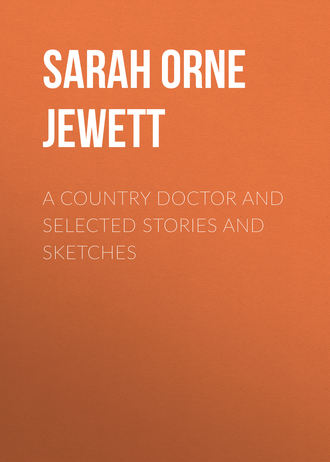 полная версия
полная версияA Country Doctor and Selected Stories and Sketches
"Where are you going to live in Shrewsbury?" I asked presently.
"I don't expect to stop long, dear creatur'. I'm 'most seventy-six year old," and Mrs. Peet turned to look at me with pathetic amusement in her honest wrinkled face. "I said right out to Is'iah, before a roomful o' the neighbors, that I expected it of him to git me home an' bury me when my time come, and do it respectable; but I wanted to airn my livin', if 'twas so I could, till then. He'd made sly talk, you see, about my electin' to leave the farm and go 'long some o' my own folks; but"—and she whispered this carefully—"he didn't give me no chance to stay there without hurtin' my pride and dependin' on him. I ain't said that to many folks, but all must have suspected. A good sight on 'em's had money of Is'iah, though, and they don't like to do nothin' but take his part an' be pretty soft spoken, fear it'll git to his ears. Well, well, dear, we'll let it be bygones, and not think of it no more;" but I saw the great tears roll slowly down her cheeks, and she pulled her bonnet forward impatiently, and looked the other way.
"There looks to be plenty o' good farmin' land in this part o' the country," she said, a minute later. "Where be we now? See them handsome farm buildin's; he must be a well-off man." But I had to tell my companion that we were still within the borders of the old town where we had both been born. Mrs. Peet gave a pleased little laugh, like a girl. "I'm expectin' Shrewsbury to pop up any minute. I'm feared to be kerried right by. I wa'n't never aboard of the cars before, but I've so often thought about 'em I don't know but it seems natural. Ain't it jest like flyin' through the air? I can't catch holt to see nothin'. Land! and here's my old cat goin' too, and never mistrustin'. I ain't told you that I'd fetched her."
"Is she in that basket?" I inquired with interest.
"Yis, dear. Truth was, I calc'lated to have her put out o' the misery o' movin', an spoke to one o' the Barnes boys, an' he promised me all fair; but he wa'n't there in season, an' I kind o' made excuse to myself to fetch her along. She's an' old creatur', like me, an' I can make shift to keep her some way or 'nuther; there's probably mice where we're goin', an' she's a proper mouser that can about keep herself if there's any sort o' chance. 'T will be somethin' o' home to see her goin' an' comin', but I expect we're both on us goin' to miss our old haunts. I'd love to know what kind o' mousin' there's goin' to be for me."
"You mustn't worry," I answered, with all the bravery and assurance that I could muster. "Your niece will be thankful to have you with her. Is she one of Mrs. Winn's daughters?"
"Oh, no, they ain't able; it's Sister Wayland's darter Isabella, that married the overseer of the gre't carriage-shop. I ain't seen her since just after she was married; but I turned to her first because I knew she was best able to have me, and then I can see just how the other girls is situated and make me some kind of a plot. I wrote to Isabella, though she is ambitious, and said 'twas so I'd got to ask to come an' make her a visit, an' she wrote back she would be glad to have me; but she didn't write right off, and her letter was scented up dreadful strong with some sort o' essence, and I don't feel heartened about no great of a welcome. But there, I've got eyes, an' I can see ho't is when I git where't is. Sister Winn's gals ain't married, an' they've always boarded, an' worked in the shop on trimmin's. Isabella's well off; she had some means from her father's sister. I thought it all over by night an' day, an' I recalled that our folks kept Sister Wayland's folks all one winter, when he'd failed up and got into trouble. I'm reckonin' on sendin' over to-night an' gittin' the Winn gals to come and see me and advise. Perhaps some on 'em may know of somebody that'll take me for what help I can give about house, or some clever folks that have been lookin' for a smart cat, any ways; no, I don't know's I could let her go to strangers.
"There was two or three o' the folks round home that acted real warm-hearted towards me, an' urged me to come an' winter with 'em," continued the exile; "an' this mornin' I wished I'd agreed to, 'twas so hard to break away. But now it's done I feel more'n ever it's best. I couldn't bear to live right in sight o' the old place, and come spring I shouldn't 'prove of nothing Is'iah ondertakes to do with the land. Oh, dear sakes! now it comes hard with me not to have had no child'n. When I was young an' workin' hard and into everything, I felt kind of free an' superior to them that was so blessed, an' their houses cluttered up from mornin' till night, but I tell ye it comes home to me now. I'd be most willin' to own to even Is'iah, mean's he is; but I tell ye I'd took it out of him 'fore he was a grown man, if there'd be'n any virtue in cow-hidin' of him. Folks don't look like wild creatur's for nothin'. Is'iah's got fox blood in him, an' p'r'haps 't is his misfortune. His own mother always favored the looks of an old fox, true's the world; she was a poor tool,—a poor tool! I d' know's we ought to blame him same's we do.
"I've always been a master proud woman, if I was riz among the pastures," Mrs. Peet added, half to herself. There was no use in saying much to her; she was conscious of little beside her own thoughts and the smouldering excitement caused by this great crisis in her simple existence. Yet the atmosphere of her loneliness, uncertainty, and sorrow was so touching that after scolding again at her nephew's treachery, and finding the tears come fast to my eyes as she talked, I looked intently out of the car window, and tried to think what could be done for the poor soul. She was one of the old-time people, and I hated to have her go away; but even if she could keep her home she would soon be too feeble to live there alone, and some definite plan must be made for her comfort. Farms in that neighborhood were not valuable. Perhaps through the agency of the law and quite in secret, Isaiah Peet could be forced to give up his unrighteous claim. Perhaps, too, the Winn girls, who were really no longer young, might have saved something, and would come home again. But it was easy to make such pictures in one's mind, and I must do what I could through other people, for I was just leaving home for a long time. I wondered sadly about Mrs. Peet's future, and the ambitious Isabella, and the favorite Sister Winn's daughters, to whom, with all their kindliness of heart, the care of so old and perhaps so dependent an aunt might seem impossible. The truth about life in Shrewsbury would soon be known; more than half the short journey was already past.
To my great pleasure, my fellow-traveler now began to forget her own troubles in looking about her. She was an alert, quickly interested old soul, and this was a bit of neutral ground between the farm and Shrewsbury, where she was unattached and irresponsible. She had lived through the last tragic moments of her old life, and felt a certain relief, and Shrewsbury might be as far away as the other side of the Rocky Mountains for all the consciousness she had of its real existence. She was simply a traveler for the time being, and began to comment, with delicious phrases and shrewd understanding of human nature, on two or three persons near us who attracted her attention.
"Where do you s'pose they be all goin'?" she asked contemptuously. "There ain't none on 'em but what looks kind o' respectable. I'll warrant they've left work to home they'd ought to be doin'. I knowed, if ever I stopped to think, that cars was hived full o' folks, an' wa'n't run to an' fro for nothin'; but these can't be quite up to the average, be they? Some on 'em's real thrif'less; guess they've be'n shoved out o' the last place, an' goin' to try the next one,—like me, I suppose you'll want to say! Jest see that flauntin' old creatur' that looks like a stopped clock. There! everybody can't be o' one goodness, even preachers."
I was glad to have Mrs. Peet amused, and we were as cheerful as we could be for a few minutes. She said earnestly that she hoped to be forgiven for such talk, but there were some kinds of folks in the cars that she never had seen before. But when the conductor came to take her ticket she relapsed into her first state of mind, and was at a loss.
"You'll have to look after me, dear, when we get to Shrewsbury," she said, after we had spent some distracted moments in hunting for the ticket, and the cat had almost escaped from the basket, and the bundle-handkerchief had become untied and all its miscellaneous contents scattered about our laps and the floor. It was a touching collection of the last odds and ends of Mrs. Peet's housekeeping: some battered books, and singed holders for flatirons, and the faded little shoulder shawl that I had seen her wear many a day about her bent shoulders. There were her old tin match-box spilling all its matches, and a goose-wing for brushing up ashes, and her much-thumbed Leavitt's Almanac. It was most pathetic to see these poor trifles out of their places. At last the ticket was found in her left-hand woolen glove, where her stiff, work-worn hand had grown used to the feeling of it.
"I shouldn't wonder, now, if I come to like living over to Shrewsbury first-rate," she insisted, turning to me with a hopeful, eager look to see if I differed. "You see't won't be so tough for me as if I hadn't always felt it lurking within me to go off some day or 'nother an' see how other folks did things. I do' know but what the Winn gals have laid up somethin' sufficient for us to take a house, with the little mite I've got by me. I might keep house for us all, 'stead o' boardin' round in other folks' houses. That I ain't never been demeaned to, but I dare say I should find it pleasant in some ways. Town folks has got the upper hand o' country folks, but with all their work an' pride they can't make a dandelion. I do' know the times when I've set out to wash Monday mornin's, an' tied out the line betwixt the old pucker-pear tree and the corner o' the barn, an' thought, 'Here I be with the same kind o' week's work right over again.' I'd wonder kind o' f'erce if I couldn't git out of it noways; an' now here I be out of it, and an uprooteder creatur' never stood on the airth. Just as I got to feel I had somethin' ahead come that spool-factory business. There! you know he never was a forehanded man; his health was slim, and he got discouraged pretty nigh before ever he begun. I hope he don't know I'm turned out o' the old place. 'Is'iah's well off; he'll do the right thing by ye,' says he. But my! I turned hot all over when I found out what I'd put my name to,—me that had always be'n counted a smart woman! I did undertake to read it over, but I couldn't sense it. I've told all the folks so when they laid it off on to me some: but hand-writin' is awful tedious readin' and my head felt that day as if the works was gone.
"I ain't goin' to sag on to nobody," she assured me eagerly, as the train rushed along. "I've got more work in me now than folks expects at my age. I may be consid'able use to Isabella. She's got a family, an' I'll take right holt in the kitchen or with the little gals. She had four on 'em, last I heared. Isabella was never one that liked house-work. Little gals! I do' know now but what they must be about grown, time doos slip away so. I expect I shall look outlandish to 'em. But there! everybody knows me to home, an' nobody knows me to Shrewsbury; 'twon't make a mite o' difference, if I take holt willin'."
I hoped, as I looked at Mrs. Peet, that she would never be persuaded to cast off the gathered brown silk bonnet and the plain shawl that she had worn so many years; but Isabella might think it best to insist upon more modern fashions. Mrs. Peet suggested, as if it were a matter of little consequence, that she had kept it in mind to buy some mourning; but there were other things to be thought of first, and so she had let it go until winter, any way, or until she should be fairly settled in Shrewsbury.
"Are your nieces expecting you by this train?" I was moved to ask, though with all the good soul's ready talk and appealing manner I could hardly believe that she was going to Shrewsbury for more than a visit; it seemed as if she must return to the worn old farmhouse over by the sheep-lands. She answered that one of the Barnes boys had written a letter for her the day before, and there was evidently little uneasiness about her first reception.
We drew near the junction where I must leave her within a mile of the town. The cat was clawing indignantly at the basket, and her mistress grew as impatient of the car. She began to look very old and pale, my poor fellow-traveler, and said that she felt dizzy, going so fast. Presently the friendly red-cheeked young brakeman came along, bringing the carpet-bag and other possessions, and insisted upon taking the alarmed cat beside, in spite of an aggressive paw that had worked its way through the wicker prison. Mrs. Peet watched her goods disappear with suspicious eyes, and clutched her bundle-handkerchief as if it might be all that she could save. Then she anxiously got to her feet, much too soon, and when I said good-by to her at the car door she was ready to cry. I pointed to the car which she was to take next on the branch line of railway, and I assured her that it was only a few minutes' ride to Shrewsbury, and that I felt certain she would find somebody waiting. The sight of that worn, thin figure adventuring alone across the platform gave my heart a sharp pang as the train carried me away.
Some of the passengers who sat near asked me about my old friend with great sympathy, after she had gone. There was a look of tragedy about her, and indeed it had been impossible not to get a good deal of her history, as she talked straight on in the same tone, when we stopped at a station, as if the train were going at full speed, and some of her remarks caused pity and amusements by turns. At the last minute she said, with deep self-reproach, "Why, I haven't asked a word about your folks; but you'd ought to excuse such an old stray hen as I be."
In the spring I was driving by on what the old people of my native town call the sheep-lands road, and the sight of Mrs. Peet's former home brought our former journey freshly to my mind. I had last heard from her just after she got to Shrewsbury, when she had sent me a message.
"Have you ever heard how she got on?" I eagerly asked my companion.
"Didn't I tell you that I met her in Shrewsbury High Street one day?" I was answered. "She seemed perfectly delighted with everything. Her nieces have laid up a good bit of money, and are soon to leave the mill, and most thankful to have old Mrs. Peet with them. Somebody told me that they wished to buy the farm here, and come back to live, but she wouldn't hear of it, and thought they would miss too many privileges. She has been going to concerts and lectures this winter, and insists that Isaiah did her a good turn."
We both laughed. My own heart was filled with joy, for the uncertain, lonely face of this homeless old woman had often haunted me. The rain-blackened little house did certainly look dreary, and a whole lifetime of patient toil had left few traces. The pucker-pear tree was in full bloom, however, and gave a welcome gaiety to the deserted door-yard.
A little way beyond we met Isaiah Peet, the prosperous money-lender, who had cheated the old woman of her own. I fancied that he looked somewhat ashamed, as he recognized us. To my surprise, he stopped his horse in most social fashion.
"Old Aunt Peet's passed away," he informed me briskly. "She had a shock, and went right off sudden yisterday fore-noon. I'm about now tendin' to the funeral 'rangements. She's be'n extry smart, they say, all winter,—out to meetin' last Sabbath; never enjoyed herself so complete as she has this past month. She'd be'n a very hard-workin' woman. Her folks was glad to have her there, and give her every attention. The place here never was good for nothin'. The old gen'leman,—uncle, you know,—he wore hisself out tryin' to make a livin' off from it."
There was an ostentatious sympathy and half-suppressed excitement from bad news which were quite lost upon us, and we did not linger to hear much more. It seemed to me as if I had known Mrs. Peet better than any one else had known her. I had counted upon seeing her again, and hearing her own account of Shrewsbury life, its pleasures and its limitations. I wondered what had become of the cat and the contents of the faded bundle-handkerchief.
The White Rose Road
Being a New Englander, it is natural that I should first speak about the weather. Only the middle of June, the green fields, and blue sky, and bright sun, with a touch of northern mountain wind blowing straight toward the sea, could make such a day, and that is all one can say about it. We were driving seaward through a part of the country which has been least changed in the last thirty years,—among farms which have been won from swampy lowland, and rocky, stump-buttressed hillsides: where the forests wall in the fields, and send their outposts year by year farther into the pastures. There is a year or two in the history of these pastures before they have arrived at the dignity of being called woodland, and yet are too much shaded and overgrown by young trees to give proper pasturage, when they made delightful harbors for the small wild creatures which yet remain, and for wild flowers and berries. Here you send an astonished rabbit scurrying to his burrow, and there you startle yourself with a partridge, who seems to get the best of the encounter. Sometimes you see a hen partridge and her brood of chickens crossing your path with an air of comfortable door-yard security. As you drive along the narrow, grassy road, you see many charming sights and delightful nooks on either hand, where the young trees spring out of a close-cropped turf that carpets the ground like velvet. Toward the east and the quaint fishing village of Ogunquit, I find the most delightful woodland roads. There is little left of the large timber which once filled the region, but much young growth, and there are hundreds of acres of cleared land and pasture-ground where the forests are springing fast and covering the country once more, as if they had no idea of losing in their war with civilization and the intruding white settler. The pine woods and the Indians seem to be next of kin, and the former owners of this corner of New England are the only proper figures to paint into such landscapes. The twilight under tall pines seems to be untenanted and to lack something, at first sight, as if one opened the door of an empty house. A farmer passing through with his axe is but an intruder, and children straying home from school give one a feeling of solicitude at their unprotectedness. The pine woods are the red man's house, and it may be hazardous even yet for the gray farmhouses to stand so near the eaves of the forest. I have noticed a distrust of the deep woods, among elderly people, which was something more than a fear of losing their way. It was a feeling of defenselessness against some unrecognized but malicious influence.
Driving through the long woodland way, shaded and chilly when you are out of the sun; across the Great Works River and its pretty elm-grown intervale; across the short bridges of brown brooks; delayed now and then by the sight of ripe strawberries in sunny spots by the roadside, one comes to a higher open country, where farm joins farm, and the cleared fields lie all along the highway, while the woods are pushed back a good distance on either hand. The wooded hills, bleak here and there with granite ledges, rise beyond. The houses are beside the road, with green door-yards and large barns, almost empty now, and with wide doors standing open, as if they were already expecting the hay crop to be brought in. The tall green grass is waving in the fields as the wind goes over, and there is a fragrance of whiteweed and ripe strawberries and clover blowing through the sunshiny barns, with their lean sides and their festoons of brown, dusty cobwebs; dull, comfortable creatures they appear to imaginative eyes, waiting hungrily for their yearly meal. The eave-swallows are teasing their sleepy shapes, like the birds which flit about great beasts; gay, movable, irreverent, almost derisive, those barn swallows fly to and fro in the still, clear air.
The noise of our wheels brings fewer faces to the windows than usual, and we lose the pleasure of seeing some of our friends who are apt to be looking out, and to whom we like to say good-day. Some funeral must be taking place, or perhaps the women may have gone out into the fields. It is hoeing-time and strawberry-time, and already we have seen some of the younger women at work among the corn and potatoes. One sight will be charming to remember. On a green hillside sloping to the west, near one of the houses, a thin little girl was working away lustily with a big hoe on a patch of land perhaps fifty feet by twenty. There were all sorts of things growing there, as if a child's fancy had made the choice,—straight rows of turnips and carrots and beets, a little of everything, one might say; but the only touch of color was from a long border of useful sage in full bloom of dull blue, on the upper side. I am sure this was called Katy's or Becky's piece by the elder members of the family. One can imagine how the young creature had planned it in the spring, and persuaded the men to plough and harrow it, and since then had stoutly done all the work herself, and meant to send the harvest of the piece to market, and pocket her honest gains, as they came in, for some great end. She was as thin as a grasshopper, this busy little gardener, and hardly turned to give us a glance, as we drove slowly up the hill close by. The sun will brown and dry her like a spear of grass on that hot slope, but a spark of fine spirit is in the small body, and I wish her a famous crop. I hate to say that the piece looked backward, all except the sage, and that it was a heavy bit of land for the clumsy hoe to pick at. The only puzzle is, what she proposes to do with so long a row of sage. Yet there may be a large family with a downfall of measles yet ahead, and she does not mean to be caught without sage-tea.
Along this road every one of the old farmhouses has at least one tall bush of white roses by the door,—a most lovely sight, with buds and blossoms, and unvexed green leaves. I wish that I knew the history of them, and whence the first bush was brought. Perhaps from England itself, like a red rose that I know in Kittery, and the new shoots from the root were given to one neighbor after another all through the district. The bushes are slender, but they grow tall without climbing against the wall, and sway to and fro in the wind with a grace of youth and an inexpressible charm of beauty. How many lovers must have picked them on Sunday evenings, in all the bygone years, and carried them along the roads or by the pasture footpaths, hiding them clumsily under their Sunday coats if they caught sight of any one coming. Here, too, where the sea wind nips many a young life before its prime, how often the white roses have been put into paler hands, and withered there!
In spite of the serene and placid look of the old houses, one who has always known them cannot help thinking of the sorrows of these farms and their almost undiverted toil. Near the little gardener's plot, we turned from the main road and drove through lately cleared woodland up to an old farmhouse, high on a ledgy hill, whence there is a fine view of the country seaward and mountainward. There were few of the once large household left there: only the old farmer, who was crippled by war wounds, active, cheerful man that he was once, and two young orphan children. There has been much hard work spent on the place. Every generation has toiled from youth to age without being able to make much beyond a living. The dollars that can be saved are but few, and sickness and death have often brought their bitter cost. The mistress of the farm was helpless for many years; through all the summers and winters she sat in her pillowed rocking-chair in the plain room. She could watch the seldom-visited lane, and beyond it, a little way across the fields, were the woods; besides these, only the clouds in the sky. She could not lift her food to her mouth; she could not be her husband's working partner. She never went into another woman's house to see her works and ways, but sat there, aching and tired, vexed by flies and by heat, and isolated in long storms. Yet the whole countryside neighbored her with true affection. Her spirit grew stronger as her body grew weaker, and the doctors, who grieved because they could do so little with their skill, were never confronted by that malady of the spirit, a desire for ease and laziness, which makes the soundest of bodies useless and complaining. The thought of her blooms in one's mind like the whitest of flowers; it makes one braver and more thankful to remember the simple faith and patience with which she bore her pain and trouble. How often she must have said, "I wish I could do something for you in return," when she was doing a thousand times more than if, like her neighbors, she followed the simple round of daily life! She was doing constant kindness by her example; but nobody can tell the woe of her long days and nights, the solitude of her spirit, as she was being lifted by such hard ways to the knowledge of higher truth and experience. Think of her pain when, one after another, her children fell ill and died, and she could not tend them! And now, in the same worn chair where she lived and slept sat her husband, helpless too, thinking of her, and missing her more than if she had been sometimes away from home, like other women. Even a stranger would miss her in the house.






